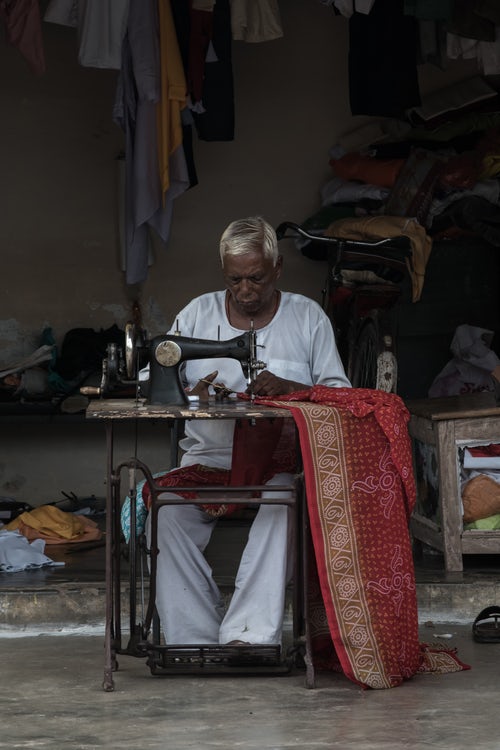
Photo by elCarito
For five months I was the Seattle Post-Intelligencer’s WTO reporter, writing about the trade issues, politics and preparations for the World Trade Organization’s ministerial meeting in Seattle scheduled for Nov. 30-Dec. 1, 1999. As the date approached, it was clear that a protest was coming from people who opposed the WTO, and trade and global capitalism generally. Part of my job was to understand those people and communicate their point of view — a point of view I thought was bizarre. Here is one of my weekly business columns, from late in the year, shortly before the events. This is a potluck dinner in the home of one of the pro-trade people to which some of the anti-trade people are invited. The idea is to have a dialogue, and understand each other.
I brought a bowl of my wife’s chow mein. A few minutes into dinner a guy came up to me and said, “Is there meat in that chow mein?” (There was. Pork.)
We were from different worlds. Here is my P-I business column of November 24, 1999.
In the debate about trade, each side says, “You’re not listening.” Each side says to the other, “What you say about me is not true.”
Each side has its own language, a name for itself (free trader, fair trader) and its opponents (protectionist, corporate globalist).
Fair traders come in several varieties. Jeff Faux, president of the Economic Policy Institute in Washington, D.C., expects to see three groups on the streets of Seattle during the WTO meetings: nationalists, who want to protect jobs and laws in their own country; global villagers, who want to protect indigenous economies and environments, often in other countries; and global New Dealers, who want to abolish child labor and protect union organizers around the world.
The nationalists and the global villagers want to wall off part of the world from outside. The global New Dealers want to change the outside. They’re not against a global market. They just want it to come with labor and environmental regulations. They get annoyed at being lumped in with “opponents” of trade.
The free traders get annoyed at being labeled apologists for corporate profit. They are that, partly; to them, profit provides jobs and income, stable communities, theater companies, etc. Profit is good. They also argue that trade brings profit to both sides.
I heard many of these arguments last month at a potluck dinner. It was a WTO party, an event perhaps unique to Seattle. The host worked for a company involved in trade. Some of his guests were fair-trade activists. We ate, drank and argued for hours. At the end, several said they understood their opponents better, and that they weren’t that far apart. It seemed to me they were. But it was a nice thing to say.
The fair traders wanted to make moral choices. Speaking of Europe’s ban on hormone-treated beef, which was done without a scientific risk assessment, one woman said, “I think it is noble that they decided not to base it on science, and decided to do what was right.” She did not want genetically modified food no matter what the scientists said. Such food should be forbidden.
The free trader asked, “Suppose I want to buy it?”
“We’ll give you a vote,” she said.
The free trader didn’t believe he would get a vote. At the national level, there has never been a direct vote on a policy question. And there is no way to have one, short of amending the Constitution.
Where there are initiatives and referendums, the fair traders have not used them. When they wanted a resolution against the Multilateral Agreement on Investment, they lobbied the King County Council. They got it. But few voters ever knew about it.
Secondly, the free trader didn’t want one vote in a million about food policy. He wanted to be able to choose his dinner. To him, the issue was freedom.
To the fair trader, the issue was democracy. The democratic government of Norway forbade the importing of American apples until the Norwegian crop had been sold. Because of the WTO agreement, Norway had to change its policy. One fair trader, hearing this, was troubled. “I’m not sure I agree with you that Norway should buy American apples — if they don’t want to,” he said.
Another fair trader said she didn’t want the WTO dictating what we had to allow in our market. “We want to make our own decisions of what’s socially responsible,” she said.
Each side spoke of making its own decisions. One side said “we.” The other said “I.” There was the difference.
Another difference was evaluating the social effect of the decision. When the free trader said, “Look, suppose I want to buy a shirt from Burma,” and talked about choice, a fair trader was looking at him with a pained expression. When he was done, she said, “Do you really want to buy a shirt from Burma?”
“That’s not the point,” he said.
Not his point — but it was her point. To the fair trader, it was wrong to buy that shirt because of the social consequences in Burma. The free trader’s assertion of his right was antisocial and should be stopped. To the free trader, he still had the right; he might decide not to exercise it out of respect for people in Burma, but it was up to him.
All this was very theoretical. The free trader had never been offered a shirt from Burma, or any other Burmese good, Burmese bond or share of a Burmese stock. Burma was not a good place to do business.
Why was that? Interesting question. We never got to it. The two sides might have found some things to agree on. At it was, it was mostly differences.
© 1979 The Seattle Post-Intelligencer
Of course, I was the free trader.